五、翻译
《老子》五章 翻译
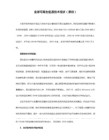
——学习经典,翻译只是工具,意会才是正道啊。
有人能实行。因此,圣人常说:能承受全国的屈辱,才配作天下的君主;能承担全国的灾难,才配作天下的君王。确切的话语常常让人觉得不以为然!
《老子》第八十章
小国寡民。使有什佰之器而不用,使民重死而不远徙。虽有舟车,无所乘之;虽有甲兵,无所陈之。使民复结绳而用之。甘其食,美其服,安其居,乐其俗。邻国相望,鸡犬之声相闻,民至老死,不相往来。
【译文】
国家要小,人民要少。即使有各种器具,也不多用;使人民珍惜生命,不作长距离的迁移;虽有船只车辆,却没必要去乘坐;虽有兵器武备,却没必要去布阵打战。使天下回复到人民都结绳纪事的远古状态之中。让人民吃得香甜,穿得漂亮,住得安适,满意于他们的平凡生活。国与国之间相互望得见,鸡犬之声相互听得见,而人民从生到死,也互不往来。
《老子》五章 翻译
《老子》第一章
道可道,非常道;名可名,非常名。无名,天地之始;有名,万物之母。故常无欲,以观其妙;常有欲,以观其徼。此两者同出而异名,同谓之玄。玄之又玄,众妙之门。
【译文】
道是可以阐述解说的,但并非等同于浑然一体,永恒存在,而有运动不息的那个大道。
《老子》第十九章
绝圣弃智,民利百倍;绝仁弃义,民复孝慈;绝巧弃利,盗贼无有。此三者以为文,不足,故令有所属:见素抱朴,少权威成见,人民可以得到更大的好处;抛弃仁、义等道德律则,人民将恢复他们的孝慈本性;抛弃技巧与厚利的助纣与诱引,盗贼将自动消失。不过,这三项措施作为治标之举,还不足以治本,所以,应把它们作为从属的措施并继之以更为基本的总体原则:表现纯真,持守混沌,减少私心杂欲。
道名也是可以命名的,但并非等同于浑然一体,永恒存在,而有运动不息的道之名。
无,天地的本初。
必修五语文文言文翻译

1、悟已往之不谏,知来者之可追。
觉悟到过去的事已经不能挽救,知道未来的事还可以补救.2、善万物之得时,感吾生之行修。
羡慕自然界的一切生物及时生长繁荣,感叹我的一生将要过去了。
3、聊乘化以归尽,乐夫天命复奚疑?姑且顺着自然的变化,度到生命的尽头,乐天安命,还犹豫什么呢?4、倚南窗以寄傲,审容膝之易安。
倚靠着南窗来寄托傲然自得的的心情,觉得住在简陋的小屋里也非常舒服。
5、世与我而相违,复驾言兮焉求?人世与我已经背离了,还要驾车出去探求什么呢?6、寓形宇内复几时,曷不委心任去留?寄身于天地之间还能有多少时候,何不随心所欲地生活而不用管他生死呢?7、问征夫以前路,恨晨光之熹微。
乃瞻衡宇,载欣载奔。
我向行人问前方的道路,恨天亮得太慢。
看见自己的房子,心中欣喜,奔跑过去。
(一边欣喜,一边狂奔)8、策扶老以流憩,时矫首而遐观.拄着拐杖出去走走,随时随地休息,时时抬起头向远处望望。
10、怀良辰以孤往,或植杖而耘籽。
爱惜(趁着)美好的时光,独自出去,有时在田里除草培苗。
11、既自以心为形役,奚惆怅而独悲?既然自己的心灵被形体所役使,为什么如此失意而独自伤悲?12、引壶觞以自酌,眄庭柯以怡颜。
我端起酒壶酒杯自斟自饮,观赏着庭树使我开颜1、襟三江而带五湖,控蛮荆而引瓯(ōu)越。
以三江为衣襟,以五湖为衣带、控制着楚地,连接着闽越。
2、天高地迥,觉宇宙之无穷。
兴尽悲来,识盈虚之有数。
苍天高远,大地寥廓,令人感到宇宙的无穷无尽。
欢乐逝去,悲哀袭来,我明白了兴衰贵贱都由命中注定。
3、老当益壮,宁移白首之心;穷且益坚,不坠青云之志。
年纪虽然老了,但志气应当更加旺盛,怎能在白头时改变心情?境遇虽然困苦,但节操应当更加坚定,不能抛弃自己的凌云壮志。
4、舍簪笏于百龄,奉晨昏于万里。
如今我抛弃了一生的功名,不远万里去朝夕侍奉父亲。
5、潦水尽而寒潭清,烟光凝而暮山紫。
地面的积水已经消尽,寒冷的潭水清澈见底,(山中的)烟雾和(晚霞的)余光凝结在一起,傍晚的山峦呈现出(高贵的)紫色。
五年级下册英语课文翻译
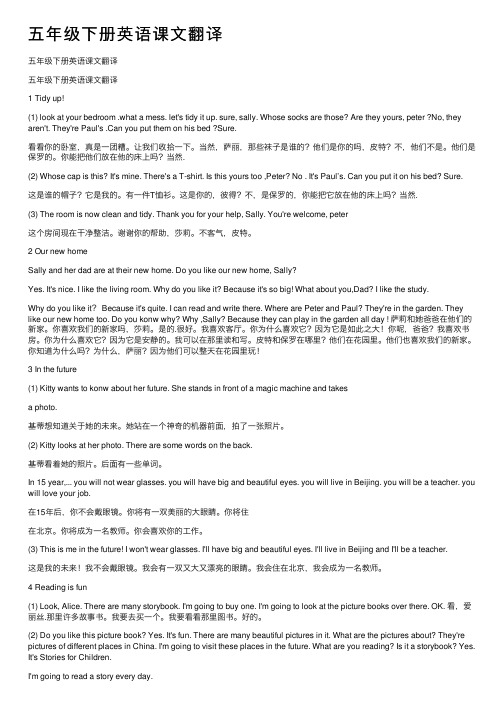
五年级下册英语课⽂翻译五年级下册英语课⽂翻译五年级下册英语课⽂翻译1 Tidy up!(1) look at your bedroom .what a mess. let's tidy it up. sure, sally. Whose socks are those? Are they yours, peter ?No, they aren't. They're Paul's .Can you put them on his bed ?Sure.看看你的卧室,真是⼀团糟。
让我们收拾⼀下。
当然,萨丽,那些袜⼦是谁的?他们是你的吗,⽪特?不,他们不是。
他们是保罗的。
你能把他们放在他的床上吗?当然.(2) Whose cap is this? It's mine. There's a T-shirt. Is this yours too ,Peter? No . It's Paul’s. Can you put it on his bed? Sure.这是谁的帽⼦?它是我的。
有⼀件T恤衫。
这是你的,彼得?不,是保罗的,你能把它放在他的床上吗?当然.(3) The room is now clean and tidy. Thank you for your help, Sally. You're welcome, peter这个房间现在⼲净整洁。
谢谢你的帮助,莎莉。
不客⽓,⽪特。
2 Our new homeSally and her dad are at their new home. Do you like our new home, Sally?Yes. It's nice. I like the living room. Why do you like it? Because it's so big! What about you,Dad? I like the study.Why do you like it? Because it's quite. I can read and write there. Where are Peter and Paul? They're in the garden. They like our new home too. Do you konw why? Why ,Sally? Because they can play in the garden all day ! 萨莉和她爸爸在他们的新家。
语文必修五文言文翻译
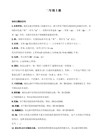
(39)胡为乎遑遑欲何之:为什么心神不定,想到哪里去呢?遑遑,不安的样子。之,往。
(40)帝乡不可期:仙境到不了。帝乡,仙乡,神仙居住的地方。期,希望,企及。
(41)怀良辰以孤往:趁着春天的美好时光,独自出去。怀,怀着,趁。良辰,好时光。
(42)或植杖而耘耔:有时放下手杖,拿起农具除草培土。植,置。耘,除草。籽,以土培苗根。
所以鹏鸟高飞九万里,狂风就在它的身下,然后才凭借风力飞行,背负青天而没有什么力量能够阻遏它了,然后才像现在这样打算飞到南方去。
3、故夫知效一官,行比一乡,德合一君,而征一国者,其自视也亦若此矣。
所以那些才智足以胜任一个官职的职守,品行合乎一乡人心愿,道德能使国君感到满意,能力足以取信一国之人的人,他们看待自己也像是这样。
外面没有什么近亲家里没有可以照应门户的童仆孤单没有依靠地独自生活 只有自己的身体和影子互相安慰。
3、臣欲奉召奔驰,则刘病日笃;欲苟顺私情,则告诉不许。
我想遵从圣旨赴京就职,但刘氏的病一天比一天严重,想姑且迁就私情,但是报告申诉又得不到准许。
4、但以刘日薄西山,气息奄奄,人命危浅,朝不虑夕。
4、且举世而誉之而不加劝,举世而非之而不加沮,定乎内外之分,辩乎荣辱之境,期已矣。
世上的人都赞誉他,他不会因此而特别努力,世上的人都非难他,他也不会因此而更加沮丧。他清楚地划定自身与外物的区别,辨别荣誉与耻辱的界限,不过如此而已呀!
5、彼于福致者,未数数然也。
列子对于寻求幸福,从来没有急急忙忙去追求。
(21)时矫首而遐观:时时抬起头向远处望望。矫,举。遐,远。
(22)云无心以出岫:云气自然而然地从山里冒出。无心,无意地。岫,山穴,此处泛指山峰。
(23)景翳翳以将入:阳光黯淡,太阳快落下去了。景,日光。翳翳,阴暗的样子。
贞观政要_择官(五)原文-翻译-全文

贞观政要·择官(5)原文|翻译|全文【译文】然而今天的群臣,洁身自好、才能出众的人非常少有,恐怕是因为朝廷求贤之心不急切,没有鼓励劝勉他们的缘故。
如果用公正忠诚去要求他们,用建功立业去激励他们,让他们各尽其职,各安其位。
处高位则看其举荐的人,身富则看其养育的人,闲居时看其所好,学习时看其言语,穷困时看其气节,卑贱时看其德行。
量才录用,发挥他们的长处,克服他们的短处,用六正去勉励他们,用六邪去警戒他们。
那么,即使不严厉地对待他们,他们自己也会振奋,不用苦口婆心地劝勉,他们也会自己努力。
【原文】故《说苑》曰:人臣之行,有六正六邪,行六正则荣,犯六邪则辱。
何谓六正?一曰萌芽未动,形兆未见,昭然独见存亡之机,得失之要,预禁乎未然之前,使主超然立乎显荣之处,如此者,圣臣也。
二曰虚心尽意,日进善道,勉主以礼义,谕主以长策,将顺其美,匡救其恶,如此者,良臣也。
三曰夙兴夜寐,进贤不懈,数称往古之行事,以厉主意,如此者,忠臣也。
四曰明察成败,早防而救之,塞其间,绝其源,转祸以为福,使君终以无忧,如此者,智臣也。
五曰守文奉法,任官职事,不受赠遗,辞禄让赐,饮食节俭,如此者,贞臣也。
六曰家国昏乱,所为不谀,敢犯主之严颜,面言主之过失,如此者,直臣也。
是谓六正。
何谓六邪?一曰安官贪禄,不务公事,与世浮沉,左右观望,如此者,具臣①也,二曰主所言皆曰善,主所为皆曰可,隐而求主之所好而进之,以快主之耳目,偷合苟容②,与主为乐,不顾其后害,如此者,谀臣也。
三曰内实险诐③,外貌小谨④,巧言令色,妒善嫉贤,所欲进,则明其美、隐其恶,所欲退,则明其过、匿⑤其美,使主赏罚不当,号令不行,如此者,奸臣也。
四曰智足以饰非,辩足以行说,内离骨肉之亲,外构朝廷之乱,如此者,谗臣也。
五曰专权擅势,以轻为重,私门成党,以富其家,擅矫主命,以自贵显,如此者,贼臣也。
六曰谄主以佞邪,陷主于不义,朋党比周,以蔽主明,使白黑无别,是非无间,使主恶布于境内,闻于四邻,如此者,亡国之臣也。
英语作文五带中文翻译

英语作文五带中文翻译Title: The Importance of Learning a Second Language。
标题,学习第二语言的重要性。
Learning a second language has become increasingly important in today's globalized world. With the rise of international trade, travel, and communication, being able to speak more than one language has become a valuable skill that can open up new opportunities in both personal and professional life. In this article, we will explore the benefits of learning a second language and why it is worth the time and effort.在当今全球化的世界中,学习第二语言变得越来越重要。
随着国际贸易、旅游和交流的增加,能够说多种语言已成为一项有价值的技能,可以在个人和职业生活中开辟新的机会。
在本文中,我们将探讨学习第二语言的好处以及为什么值得投入时间和精力。
Firstly, learning a second language can improvecognitive abilities and brain function. Research has shown that bilingual individuals have better memory, problem-solving skills, and overall cognitive flexibility. This is because learning a new language requires the brain to process and store information differently, which can leadto increased neural connections and improved cognitive function.首先,学习第二语言可以提高认知能力和大脑功能。
冀教英语五上课本翻译
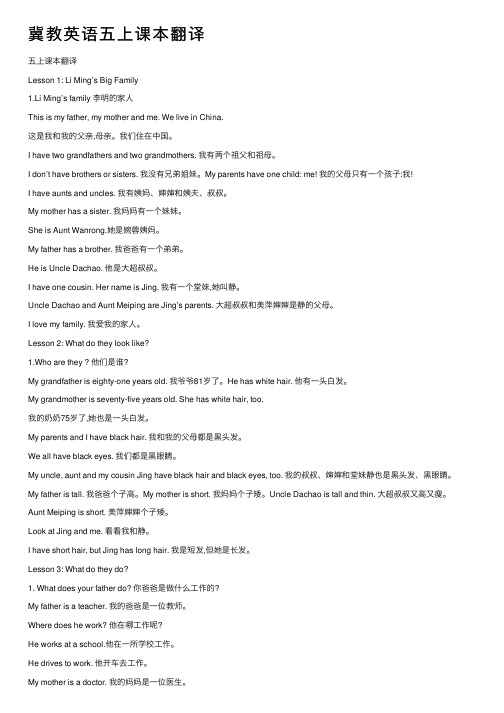
冀教英语五上课本翻译五上课本翻译Lesson 1: Li Ming’s Big Family1.Li Ming’s family 李明的家⼈This is my father, my mother and me. We live in China.这是我和我的⽗亲,母亲。
我们住在中国。
I have two grandfathers and two grandmothers. 我有两个祖⽗和祖母。
I don’t have brothers or sisters. 我没有兄弟姐妹。
My parents have one child: me! 我的⽗母只有⼀个孩⼦:我!I have aunts and uncles. 我有姨妈、婶婶和姨夫、叔叔。
My mother has a sister. 我妈妈有⼀个妹妹。
She is Aunt Wanrong.她是婉蓉姨妈。
My father has a brother. 我爸爸有⼀个弟弟。
He is Uncle Dachao. 他是⼤超叔叔。
I have one cousin. Her name is Jing. 我有⼀个堂妹,她叫静。
Uncle Dachao and Aunt Meiping are Jing’s parents. ⼤超叔叔和美萍婶婶是静的⽗母。
I love my family. 我爱我的家⼈。
Lesson 2: What do they look like?1.Who are they ? 他们是谁?My grandfather is eighty-one years old. 我爷爷81岁了。
He has white hair. 他有⼀头⽩发。
My grandmother is seventy-five years old. She has white hair, too.我的奶奶75岁了,她也是⼀头⽩发。
My parents and I have black hair. 我和我的⽗母都是⿊头发。
五年级英语课文翻译
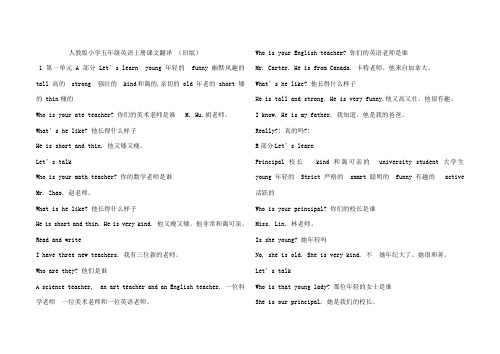
人教版小学五年级英语上册课文翻译(旧版)1 第一单元A部分Let’s learn young年轻的 funny 幽默风趣的tall 高的 strong 强壮的 kind和蔼的,亲切的 old 年老的 short 矮的 thin瘦的Who is your ate teacher? 你们的美术老师是谁 M. Hu.胡老师。
What’s he like? 他长得什么样子He is short and thin. 他又矮又瘦。
Let’s talkWho is your math teacher? 你的数学老师是谁Mr. Zhao. 赵老师。
What is he like? 他长得什么样子He is short and thin. He is very kind. 他又瘦又矮。
他非常和蔼可亲。
Read and writeI have three new teachers. 我有三位新的老师。
Who are they? 他们是谁A science teacher, an art teacher and an English teacher. 一位科学老师一位美术老师和一位英语老师。
Who is your English teacher? 你们的英语老师是谁Mr. Carter. He is from Canada. 卡特老师。
他来自加拿大。
What’s he like? 他长得什么样子He is tall and strong. He is very funny.他又高又壮。
他很有趣。
I know. He is my father. 我知道。
他是我的爸爸。
Really?! 真的吗?!B部分Let’s learnPrincipal 校长kind 和蔼可亲的university student 大学生young年轻的 Strict 严格的 smart 聪明的 funny 有趣的 active 活跃的Who is your principal? 你们的校长是谁Miss. Lin. 林老师。
five 怎么读
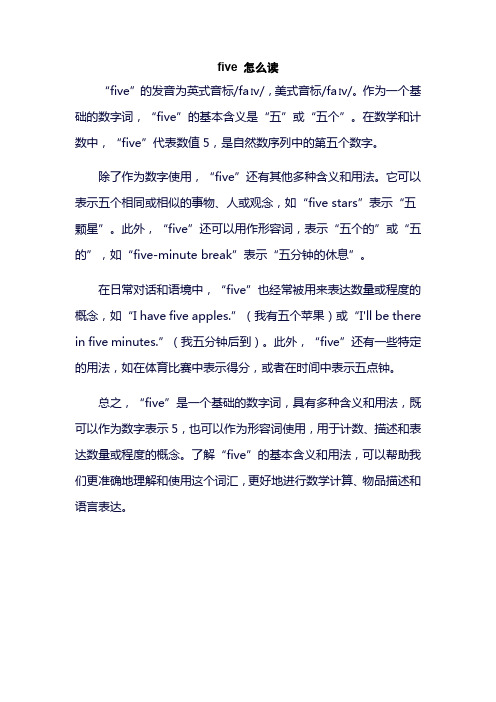
five 怎么读
“five”的发音为英式音标/faɪv/,美式音标/faɪv/。
作为一个基础的数字词,“five”的基本含义是“五”或“五个”。
在数学和计数中,“five”代表数值5,是自然数序列中的第五个数字。
除了作为数字使用,“five”还有其他多种含义和用法。
它可以表示五个相同或相似的事物、人或观念,如“five stars”表示“五颗星”。
此外,“five”还可以用作形容词,表示“五个的”或“五的”,如“five-minute break”表示“五分钟的休息”。
在日常对话和语境中,“five”也经常被用来表达数量或程度的概念,如“I have five apples.”(我有五个苹果)或“I'll be there in five minutes.”(我五分钟后到)。
此外,“five”还有一些特定的用法,如在体育比赛中表示得分,或者在时间中表示五点钟。
总之,“five”是一个基础的数字词,具有多种含义和用法,既可以作为数字表示5,也可以作为形容词使用,用于计数、描述和表达数量或程度的概念。
了解“five”的基本含义和用法,可以帮助我们更准确地理解和使用这个词汇,更好地进行数学计算、物品描述和语言表达。
PEP五年级英语Unit5课文翻译及知识点辅导

Main scence萨拉:有这么多幅画!张鹏:我爸爸很会画画。
迈克:多漂亮的照片啊!张鹏:那是我奶奶的花园。
里面有许多漂亮的花。
子普:房间里有什么?祖姆:在床的旁边有一张桌子。
PartA let’s talk萨拉:你的房间真漂亮!张鹏:谢谢。
迈克:有张大床。
张鹏:是的。
我喜欢我的床。
迈克:还有一张漂亮的照片。
萨拉:哇!你看起来真酷!张鹏:谢谢你。
嘿,我的计算机在这儿的课桌上。
我们一起玩吧!描述这幅图画:张鹏:图画里有张课桌。
萨拉:课桌上有个盘子。
张鹏:盘子上有根香蕉。
Let’s play张鹏:我的房间里有一个时钟。
约翰:我的房间里有一个时钟和一株植物。
埃米:我的房间里有一个时钟、一株植物和一张照片。
Part B let’s talk张鹏:这是客厅。
迈克:哇!这里有这么多幅画。
张鹏:是的。
我爸爸很会画画。
萨拉:这里还有这么多植物。
张鹏:它们是我奶奶的植物。
在我爷爷奶奶的房子前面有一个花园。
花园里有许多花。
萨拉:太棒了!看上面的图画。
在图画里你还能看到什么?埃米:图画里有两只狗。
奥利弗:有一些鱼。
Read and write给罗宾的一封电子邮件寄给:robin@来自:jones@十二月二十号亲爱的罗宾:我是一凡的美术老师。
我刚刚搬进一所老房子。
房间很脏。
在地板上有铅笔和蜡笔。
到处有图画和照片。
哦,不!我看到一只老鼠在我的计算机后面!请帮助我。
我住在自然公园附近。
请快点!琼斯先生Storytime1.在和旁边有一个易拉罐。
他很难过。
易拉罐:你能帮帮我吗?我很想回家。
鸟:对不起。
我很忙。
2.一只淘气的熊踢了易拉罐。
熊:哈哈!易拉罐:噢,不要!3.易拉罐从兔子和猴子上方飞过。
易拉罐:救命!猴子:看那个可怜的易拉罐。
兔子:快点吧!我们上学迟到了。
4.易拉罐落在了两条鱼中间。
鱼先生:来了个易拉罐。
鱼女士:我们把它给祖姆吧。
他能帮忙。
5.祖姆接住了易拉罐。
祖姆:让我帮你吧。
易拉罐:谢谢你。
家,甜蜜的家。
sad 伤心的,难过的can易拉罐busy忙碌的naughty 淘气的kick踢fly-flies over飞过poor可怜的come on快点catch-catches抓住,接住give …to… 把……给……注:1.an apple/an orange/an umbrella(伞)/an eggan English book/ an old house2.不可数名词:water/juice/milk/tea/Coke/Cola/coffeemeat(肉)/chicken/fish/soup/rice/beef/bread注:人+have/has+物品。
谈谈“五行”的英语翻译问题
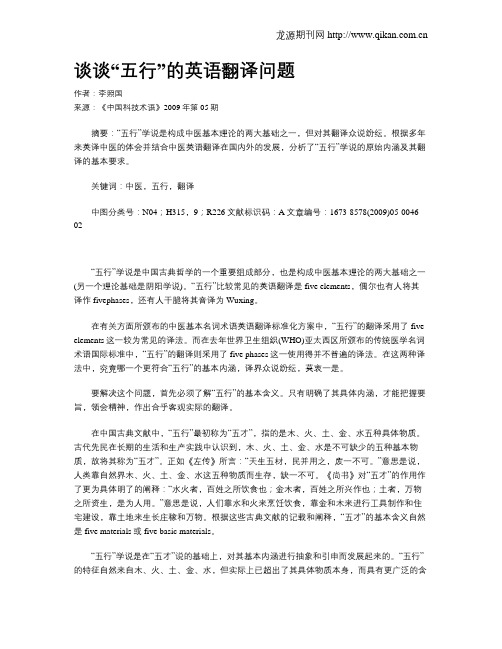
谈谈“五行”的英语翻译问题作者:李照国来源:《中国科技术语》2009年第05期摘要:“五行”学说是构成中医基本理论的两大基础之一,但对其翻译众说纷纭。
根据多年来英译中医的体会并结合中医英语翻译在国内外的发展,分析了“五行”学说的原始内涵及其翻译的基本要求。
关键词:中医,五行,翻译中图分类号:N04;H315,9;R226文献标识码:A文章编号:1673-8578(2009)05-0046-02“五行”学说是中国古典哲学的一个重要组成部分,也是构成中医基本理论的两大基础之一(另一个理论基础是阴阳学说)。
“五行”比较常见的英语翻译是five elements,偶尔也有人将其译作fivephases,还有人干脆将其音译为Wuxing。
在有关方面所颁布的中医基本名词术语英语翻译标准化方案中,“五行”的翻译采用了five elements这一较为常见的译法。
而在去年世界卫生组织(WHO)亚太西区所颁布的传统医学名词术语国际标准中,“五行”的翻译则采用了five phases这一使用得并不普遍的译法。
在这两种译法中,究竟哪一个更符合“五行”的基本内涵,译界众说纷纭,莫衷一是。
要解决这个问题,首先必须了解“五行”的基本含义。
只有明确了其具体内涵,才能把握要旨,领会精神,作出合乎客观实际的翻译。
在中国古典文献中,“五行”最初称为“五才”,指的是木、火、土、金、水五种具体物质。
古代先民在长期的生活和生产实践中认识到,木、火、土、金、水是不可缺少的五种基本物质,故将其称为“五才”。
正如《左传》所言:“天生五材,民并用之,废一不可。
”意思是说,人类靠自然界木、火、土、金、水这五种物质而生存,缺一不可。
《尚书》对“五才”的作用作了更为具体明了的阐释:“水火者,百姓之所饮食也;金木者,百姓之所兴作也;土者,万物之所资生,是为人用。
”意思是说,人们靠水和火来烹饪饮食,靠金和木来进行工具制作和住宅建设,靠土地来生长庄稼和万物。
《徐霞客游记-黔游日记五》原文及翻译
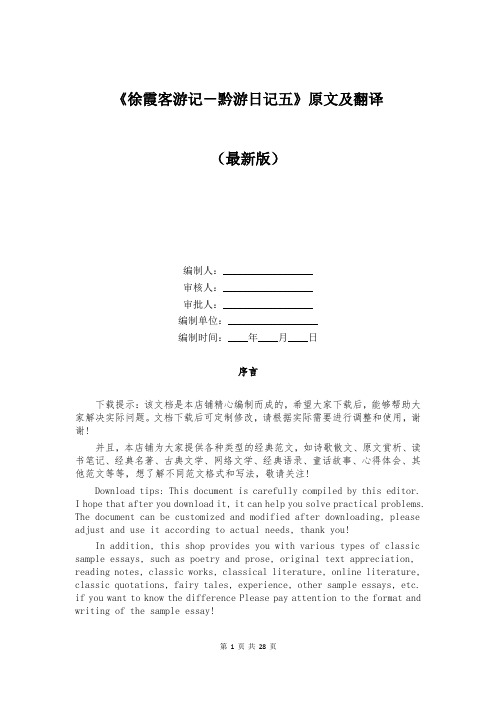
《徐霞客游记-黔游日记五》原文及翻译(最新版)编制人:__________________审核人:__________________审批人:__________________编制单位:__________________编制时间:____年____月____日序言下载提示:该文档是本店铺精心编制而成的,希望大家下载后,能够帮助大家解决实际问题。
文档下载后可定制修改,请根据实际需要进行调整和使用,谢谢!并且,本店铺为大家提供各种类型的经典范文,如诗歌散文、原文赏析、读书笔记、经典名著、古典文学、网络文学、经典语录、童话故事、心得体会、其他范文等等,想了解不同范文格式和写法,敬请关注!Download tips: This document is carefully compiled by this editor.I hope that after you download it, it can help you solve practical problems. The document can be customized and modified after downloading, please adjust and use it according to actual needs, thank you!In addition, this shop provides you with various types of classic sample essays, such as poetry and prose, original text appreciation, reading notes, classic works, classical literature, online literature, classic quotations, fairy tales, experience, other sample essays, etc. if you want to know the difference Please pay attention to the format and writing of the sample essay!《徐霞客游记-黔游日记五》原文及翻译【导语】:黔游日记五二十日早餐,随担夫出平坝南门,循西山麓南行。
人教新版英语六年级上册第五单元中文翻译

人教新版英语六年级上册Unit FiveDecember is the last month. 十二月是最后一个月。
Lesson 25There are twelve months in a year. January is the first month. The first day, January 1st, is called New Year’s Day. Look! The children are skating.February is the second month of the year. In China, the Spring Festival is in January or February. Students have their winter holiday in February. The children are celebrating the Spring Festival.March is the third month of the year. People can see green leaves and green grass everywhere. In China, Tree Planting Day is on March 12th.April is the fourth month of the year. Easter is in March or April. It can be on any day from March 20th to April 20th. Easter is always on a Sunday. During Easter, children get colourful Easter eggs.一年中有12个月。
一月是第一个月。
第一天是一月一日,被称作新年。
看!孩子们正在滑冰。
二月是一年当中的第二个月。
在中国,春节在一月和二月。
必修五课文原文及翻译
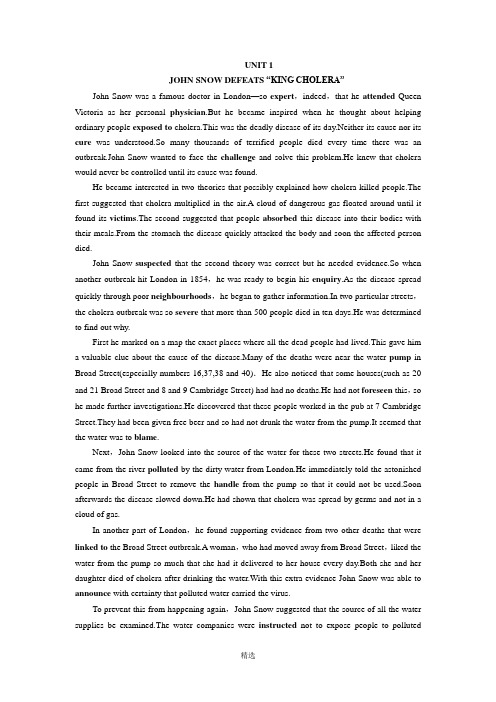
UNIT 1JOHN SNOW DEFEATS “KING CHOLERA”John Snow was a famous doctor in London—so expert,indeed,that he attended Queen Victoria as her personal physician.But he became inspired when he thought about helping ordinary people exposed to cholera.This was the deadly disease of its day.Neither its cause nor its cure was understood.So many thousands of terrified people died every time there was an outbreak.John Snow wanted to face the challenge and solve this problem.He knew that cholera would never be controlled until its cause was found.He became interested in two theories that possibly explained how cholera killed people.The first suggested that cholera multiplied in the air.A cloud of dangerous gas floated around until it found its victims.The second suggested that people absorbed this disease into their bodies with their meals.From the stomach the disease quickly attacked the body and soon the affected person died.John Snow suspected that the second theory was correct but he needed evidence.So when another outbreak hit London in 1854,he was ready to begin his enquiry.As the disease spread quickly through poor neighbourhoods,he began to gather information.In two particular streets,the cholera outbreak was so severe that more than 500 people died in ten days.He was determined to find out why.First he marked on a map the exact places where all the dead people had lived.This gave him a valuable clue about the cause of the disease.Many of the deaths were near the water pump in Broad Street(especially numbers 16,37,38 and 40).He also noticed that some houses(such as 20 and 21 Broad Street and 8 and 9 Cambridge Street) had had no deaths.He had not foreseen this,so he made further investigations.He discovered that these people worked in the pub at 7 Cambridge Street.They had been given free beer and so had not drunk the water from the pump.It seemed that the water was to blame.Next,John Snow looked into the source of the water for these two streets.He found that it came from the river polluted by the dirty water from London.He immediately told the astonished people in Broad Street to remove the handle from the pump so that it could not be used.Soon afterwards the disease slowed down.He had shown that cholera was spread by germs and not in a cloud of gas.In another part of London,he found supporting evidence from two other deaths that were linked to the Broad Street outbreak.A woman,who had moved away from Broad Street,liked the water from the pump so much that she had it delivered to her house every day.Both she and her daughter died of cholera after drinking the water.With this extra evidence John Snow was able to announce with certainty that polluted water carried the virus.To prevent this from happening again,John Snow suggested that the source of all the water supplies be examined.The water companies were instructed not to expose people to pollutedwater any more.Finally “King Cholera” was defeated.约翰·斯诺战胜“霍乱王”约翰·斯诺是伦敦一位著名的医生——他的确医术精湛,以至于成了照料维多利亚女王的私人医生。
《吕氏春秋·审分览第五》原文及翻译译文

《吕氏春秋·审分览第五》原文及翻译译文《《吕氏春秋·审分览第五》原文及翻译译文》这是优秀的文言文翻译译文文章,希望可以对您的学习工作中带来帮助!1、《吕氏春秋·审分览第五》原文及翻译译文《吕氏春秋·审分览第五》原文及翻译吕氏春秋原文:凡人主必审分,然后治可以至,奸伪邪辟之涂可以息,恶气苟疾无自至。
夫治身与治国,一理之术也。
今以众地者,公作则迟,有所匿其力也;分地则速,无所匿迟也。
主亦有地,臣主同地,则臣有所匿其都邪矣,主无所避其累矣。
凡为善难,任善易。
奚以知之?人与骥俱走,则人不胜骥矣;居於车上而任骥,则骥不胜人矣。
人主好治人官之事,则是与骥俱走也,必多所不及矣。
夫人主亦有居车,无去车,则众善皆尽力竭能矣,谄谀诐贼巧佞之人无所窜其奸矣。
人主之车,所以乘物也。
察乘物之理,则四极可有。
不知乘物,而自怙恃,夺其智能,多其教诏,而好自以,若此则百官恫扰,少长相越,万邪并起。
权威分移,不可以卒,不可以教,此亡国之风也。
有道之主,其所以使群臣者亦有辔。
其辔何如?正名审分,是治之辔已。
故按其实而审其名,以求其情;听其言而察其类,无使放悖。
夫名多不当其实,而事多不当其用者,故人主不可以不审名分也。
不审名分,是恶壅而愈塞也。
壅塞之任,不在臣下,在於人主。
尧、舜之臣不独义,汤、禹之臣不独忠,得其数也;桀、纣之臣不独鄙,幽、厉之臣不独辟,失其理也。
不正其名,不分其职,而数用刑罚,乱莫大焉。
夫说以智通,而实以过悗;誉以高贤,而充以卑下;赞以洁白,而随以污德;任以公法,而处以贪枉;用以勇敢,而堙以罢怯。
故名不正,则人主忧劳勤苦,而官职烦乱悖逆矣。
国之亡也,名之伤也,从此生矣。
白之顾益黑,求之愈不得者,其此义邪!故至治之务,在于正名。
名正则人主不忧劳矣,不忧劳则不伤其耳目之主。
故得道忘人,乃大得人也,夫其非道也?知德忘知,乃大得知也,夫其非德也?至知不几,静乃明几也。
(选自《吕氏春秋·审分览第五》)译文:凡是君主,一定要明察君臣的职分,然后国家的安定才可以实现,奸诈邪僻的渠道才可以堵塞,浊气恶疫才无法出现。
东京梦华录卷五原文及翻译
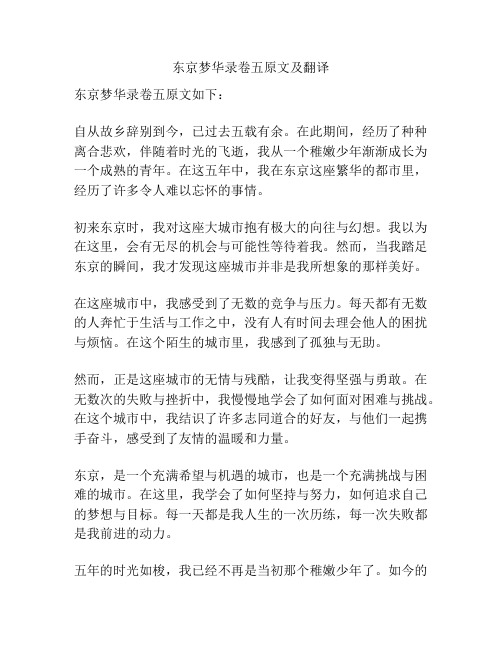
东京梦华录卷五原文及翻译东京梦华录卷五原文如下:自从故乡辞别到今,已过去五载有余。
在此期间,经历了种种离合悲欢,伴随着时光的飞逝,我从一个稚嫩少年渐渐成长为一个成熟的青年。
在这五年中,我在东京这座繁华的都市里,经历了许多令人难以忘怀的事情。
初来东京时,我对这座大城市抱有极大的向往与幻想。
我以为在这里,会有无尽的机会与可能性等待着我。
然而,当我踏足东京的瞬间,我才发现这座城市并非是我所想象的那样美好。
在这座城市中,我感受到了无数的竞争与压力。
每天都有无数的人奔忙于生活与工作之中,没有人有时间去理会他人的困扰与烦恼。
在这个陌生的城市里,我感到了孤独与无助。
然而,正是这座城市的无情与残酷,让我变得坚强与勇敢。
在无数次的失败与挫折中,我慢慢地学会了如何面对困难与挑战。
在这个城市中,我结识了许多志同道合的好友,与他们一起携手奋斗,感受到了友情的温暖和力量。
东京,是一个充满希望与机遇的城市,也是一个充满挑战与困难的城市。
在这里,我学会了如何坚持与努力,如何追求自己的梦想与目标。
每一天都是我人生的一次历练,每一次失败都是我前进的动力。
五年的时光如梭,我已经不再是当初那个稚嫩少年了。
如今的我,已经成为一个有血有肉的东京人。
这座城市已经成为了我家,每一条街道、每一个角落都充满了我奋斗与成长的记忆。
五载的日子虽然辛苦,但它也让我变得更加坚强与成熟。
我深知,只有经历了艰辛与挫折,才能真正意识到自己的价值与能力。
东京,虽然给了我无尽的考验与困难,但它也给了我机会追求梦想的舞台。
在这里,我相信,我可以实现自己的理想与抱负。
这就是我在东京五年的经历与感悟。
这座城市已经成为了我人生中最重要的一部分,它给予了我无尽的启发与启示,也帮助我成为了一个更好的自己。
以下是翻译:Since leaving my hometown and coming to Tokyo, it has been more than five years. During this period, I have experienced various joys and sorrows, and with the passage of time, I have gradually grown from a naive teenager into a mature young adult. In these five years, I have experienced many unforgettable things in this bustling city of Tokyo.When I first arrived in Tokyo, I had great longing and fantasies about this metropolis. I thought there would be endless opportunities and possibilities waiting for me here. However, the moment I set foot in Tokyo, I realized that the city was not as wonderful as I had imagined.In this city, I felt the endless competition and pressure. Countlesspeople are busy with their lives and work every day, and no one has time to care about others' troubles and worries. In this unfamiliar city, I felt lonely and helpless.However, it is precisely the ruthlessness and cruelty of this city that has made me stronger and braver. In countless failures and setbacks, I slowly learned how to face difficulties and challenges. In this city, I made many like-minded friends and we worked together, experiencing the warmth and power of friendship.Tokyo is a city full of hope and opportunities, but it is also a city full of challenges and difficulties. Here, I learned how to persevere and strive for my dreams and goals. Every day is a test in my life, and every failure is the driving force for my progress.Five years have passed in the blink of an eye, and I am no longer the naive teenager I once was. Now, I have become a Tokyoite with flesh and blood. This city has become my home, and every street and corner is filled with memories of my struggles and growth.Although the past five years have been hard, they have also made me stronger and more mature. I deeply understand that only through hardships and setbacks can one truly realize their own value and abilities. Tokyo has given me countless tests and difficulties, but it has also given me a stage to pursue my dreams. Here, I believe that I can achieve my ideals and aspirations.This is my experience and insights during my five years in Tokyo. This city has become the most important part of my life, giving meendless inspiration and guidance, and helping me become a better version of myself.。
译林版英语小学五年级上册--课文翻译(英汉对照)

Unit 1 Goldilocks and the three bearsStory time故事时间翻译Goldilocks is in the forest. There is a house.金发姑娘在森林里。
有一所房子。
What a beautiful house!多么漂亮的房子啊!Goldilocks is in the house. She is hungry and thirsty. There is some soup on the table. 金发姑娘在房子里。
她又饿又渴。
桌子上有一些汤。
This soup is too cold.这碗汤太凉了。
This soup is too hot.这碗汤太热了。
This soup is just right.这碗汤正好。
Goldilocks is tired now. There are three beds in the room.金发姑娘现在累了。
房间里有三张床。
This bed is too hard.这张床太硬了。
This bed is too soft.这张床太柔软了。
This bed is just right.这张床正好。
Goldilocks is afraid. There are three bears in front of her!金发姑娘害怕了。
在她前面有三只熊!Who are you?你是谁?Help! Help!救命啊!救命啊!Cartoon time英语课文翻译Bobby is hungry.博比饿了。
I’m hungry, Tina.我饿了,蒂娜。
You can have some cakes. There are some in the kitchen.你可以吃一些蛋糕。
在厨房里有一些。
Bobby is in the kitchen.博比在厨房里。
Where are the cakes, Tina?蛋糕在哪里,蒂娜?They’re in the fridge.它们在冰箱里。
PEP小学五年级上册英语文本翻译

PEP小学五年级上册英语文本翻译人教版小学五年级上册课文翻译第一单元A部分Let’s learnyoung年轻的funny 幽默风趣的tall 高的strong强壮的kind和蔼的,亲切的 old 年老的 short 矮的 thin瘦的Who is your ate teacher? 你们的美术老师是谁?M.Hu.胡老师。
What’s he like? 他长得什么样子?He is short and thin.他又矮又瘦。
Let’s talkWho is your math teacher? 你的数学老师是谁?Mr.Zhao.赵老师。
What is he like? 他长得什么样子?He is short and thin.He is very kind.他又瘦又矮。
他非常和蔼可亲。
Read and writeI have three new teachers.我有三位新的老师。
Who are they? 他们是谁?A science teacher,an art teacher and an English teacher.一位科学老师,一位美术老师和一位英语老师。
Who is your English teacher? 你们的英语老师是谁?Mr.Carter.He is from Canada.卡特老师。
他来自加拿大。
What’s he like? 他长得什么样子?He is tall and strong.He is very funny.他又高又壮。
他很有趣。
I know.He is my father.我知道。
他是我的爸爸。
Really?!真的吗?!B部分Let’s learnPrincipal 校长kind 和蔼可亲的university student 大学生young年轻的Strict 严格的smart 聪明的funny 有趣的active活跃的Who is your principal? 你们的校长是谁?Miss.Lin.林老师。
子曰吾十有五而志于学全文翻译

“子曰:吾十有五”的原文翻译:
我十五岁时开始以做学问为志向,三十岁时能独立做事,四十岁时能不迷惑,五十岁时知道上天的意旨,六十岁时能听得进不同的意见,到七十岁做事才能随心所欲,不会超过规矩。
出处:
“子曰:吾十有五“出自《论语·学而》
原文如下:
吾十有五而志于学,三十而立,四十而不惑,五十而知天命,六十而耳顺,七十而从心所欲,不逾矩。
注释:
十有五:十五岁。
有,同“又”,用于整数和零数之间。
立:立身,指能有所成就。
站立,站得住。
惑:迷惑,疑惑。
天命:上天的意旨。
古人认为天是世间万物的主宰。
命,命令。
耳顺:对此有多种解释,通常认为是能听得进不同的意见。
从心所欲:顺从意愿。
逾矩:越过法度。
逾,越过。
矩,法度。
